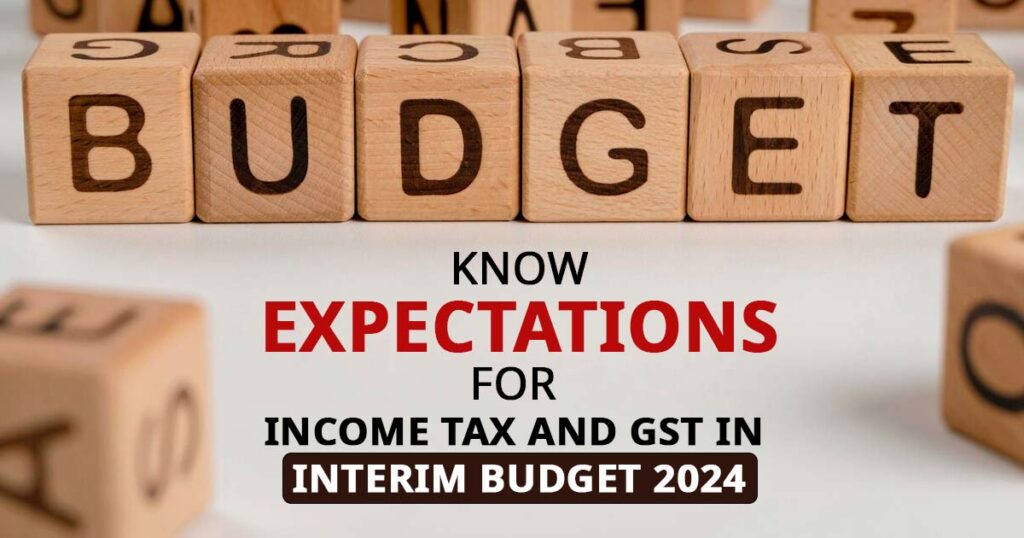
Till after the 2024 general elections’ major announcements may be held. The forthcoming interim union budget shows the chance to address the lingering subjects and set the phase for the coming economic growth.
This budget seems to prioritize fiscal discipline and prevent populist measures. In the domain of the personal income tax, there is optimism for the relief specifically in the new tax regime.
Understanding the Former Budget 2023
- First Budget in “Amrit Kaal”- The same set the regime for the coming 25 years of India’s growth.
- Economy on the correct path- A 7% rise is estimated for FY23 which is the highest among major economies.
- Focus on major areas- Infrastructure Inclusive development, green growth, youth power, and the financial sector.
Key Declaration on Income Tax
- The new tax regime becomes the default, but the old regime is also available.
- No tax on income up to Rs 7.5 lakh in the new regime (Rebate + Standard Deduction)
- The highest surcharge rate was reduced from 37% to 25% in the new regime.
- New income tax slabs: 0-3 lakh (nil), 3-6 lakh (5%), 6-9 lakh (10%), 9-12 lakh (15%), 12-15 lakh (20%), 15 lakh+ (30%).
Key Expectations in Income Tax for Budget 2024
Tax deduction 80D limit- Under Section 80D the deduction limit for medical insurance premiums must be augmented from ₹25,000 to ₹50,000 for individuals and ₹50,000 to ₹75,000 for senior citizens, reflecting rising healthcare costs.
Extending section 80D advantages to the new tax regime facilitates fair access to healthcare.
TDS compliance for home consumers- At present, there is a 1% TDS deducted on property purchases of more than Rs 50 lakh. This process is straightforward for resident sellers (using Form 26QB), but it becomes more complex for Non-Resident Indian (NRI) sellers.
Bengaluru metro city status – For HRA exemption, Bangalore to be considered a metro city- Bengaluru remains classified as a non-metro for income tax pursuits, limiting HRA deductions to 40% for its residents instead of 50% available in other metro cities while as per the Indian Constitution, it is recognized as a metro city.
Key Expectations in GST Compliance for Budget 2024
Facilitating Customs law- Interim Budget 2024 is exempted to be focused on easing the customs laws compliance instead of GST law which is addressed in the meetings of the GST council. The Central GST Act goes with the revisions to align with certain GST rules that have been passed recently, Budget 2024 expectations consist of significant aspects.
Introduction of amended annual GST return form: Additional expectations comprise of introduction of an amended annual GST return form permitting the assessees to improve the errors in the GSTR-9 form, specifically for B2B transactions. The same measure has the motive to prevent unnecessary investigation via tax officers because of the errors in the originally filed returns.
Reverse charge GST for non-compliant sellers- an upgraded reverse charge-based mechanism is to be anticipated for effective GST compliance. The buyers who are large assessees with turnovers of more than Rs 100 cr or Rs 500 cr can pay the GST dues directly to the government rather than to their small vendors.
Read Also: FM May Plan Reforms of GST System in Union Budget 2024
The same transformation in the payment of tax onus targets to relieve the compliance load on the small businesses and ease the smoother transactions for the large companies that deal with the smaller vendors.
Conclusion: The above-mentioned proposals would ensure on-time GST remittance by big players, allowing small businesses to submit quarterly or half-yearly statements, and minimizing their monthly tax payments regulations.
This modification could also iron out the issues faced by big businesses dealing with small vendors, as it shifts the accountability of tax payment to buyers, makes the input tax credit(ITC) claims more feasible, and minimizes administrative load linked with their follow-up with small vendors.